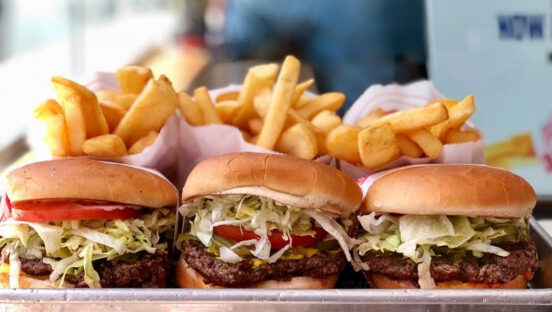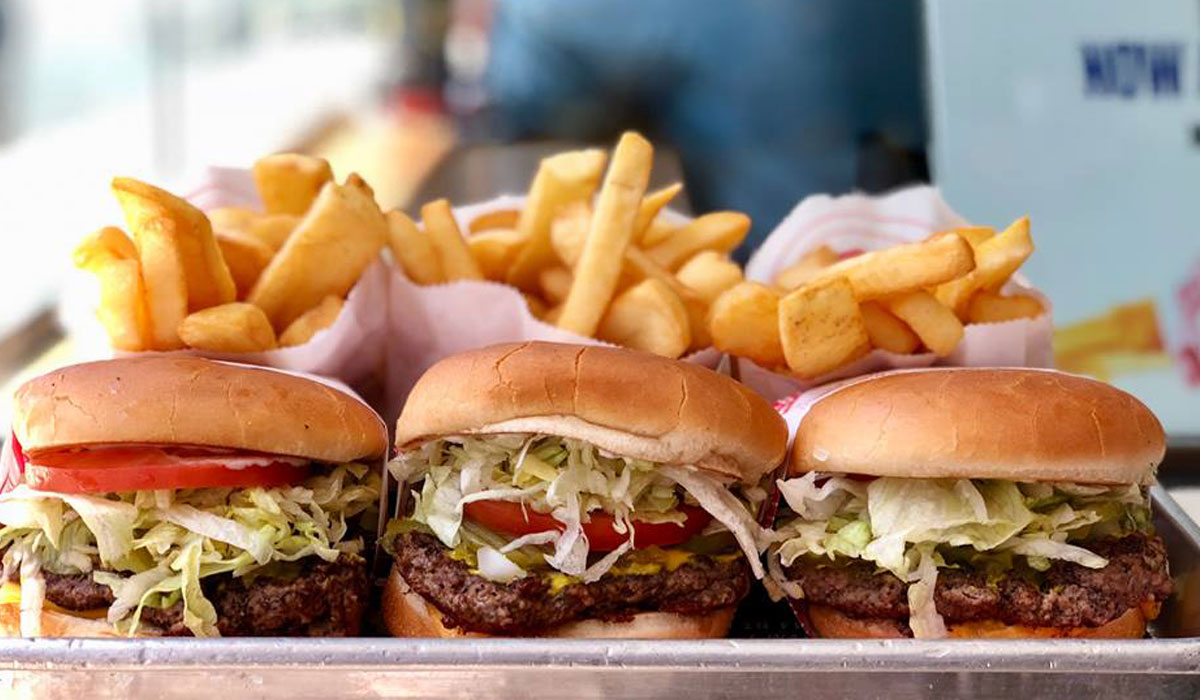FAT Brands’ manufacturing facility in Atlanta and the Twin Peaks restaurant chain are two “crown jewels” that could help the company pay down debt from its acquisition spree, CEO Andy Wiederhorn said. A robust development pipeline also will help the company reduce its leverage ratio as it works to pay back funds after a busy few years of borrowing.
FAT Brands purchased Johnny Rockets for $25 million in 2020, followed by Global Franchise Group, which consists of Round Table Pizza, Great American Cookies, Marble Slab Creamery, Hot Dog on a Stick, and Pretzelmaker, for $442.5 million in 2021. That same year, it acquired Twin Peaks, Fazoli’s, and Native Grill & Wings for $300 million, $130 million, and $20 million, respectively. Last year, it scooped up Nestlé Toll House Café and began converting the locations to Great American Cookies.
The acquisitions, coupled with ongoing sales recovery coming out of the pandemic, drove a 40 percent increase in revenues in Q4. Total revenues were $103.8 million for the 13-week period, compared to $74.2 million in Q4 of 2021. Systemwide sales were $532.9 million, up 22.1 percent from $436.3 million a year ago, with same-store sales up 2.7 percent. Full-year revenues grew more than 240 percent to $407.2 million, with same-store sales up 6 percent for the year.
FAT Brands reported an adjusted net loss of $43 million in Q4, compared to an adjusted net loss of $16.5 million in the same period a year ago. Adjusted EBITDA grew 88.5 percent in the quarter to $19.6 million. For the full year, the company reported an adjusted net loss of $80.9 million, compared to an adjusted net loss of $20.6 million in fiscal 2021. It ended the year with $88.8 million in adjusted EBITDA, a 320 percent increase from $21.1 million in the prior year.
FAT Brands is targeting between 150 and 175 new stores in 2023, which would surpass the record it set last year when it broke the three-figure threshold for the first time. The company opened 142 new stores in 2022, including 44 in Q4. It signed 110 new franchise development agreements representing a total of 362 new stores. Leading the pack were Fatburger and Buffalo’s Express with 86 new stores, followed by Fazoli’s with 61, Round Table Pizza with 56, and Twin Peaks with 50 new sports lodges signed. Noteworthy deals included a combined 80-store development agreement for 40 Fatburger and Buffalo’s Express locations and 40 Round Table Pizza restaurants in Texas, a 32-store agreement for Twin Peaks in Mexico, and a 10-store agreement for Johnny Rockets in Israel.
The company has a 1,000-unit pipeline that it plans to complete within five years. When that pipeline materializes, it is expected to lift adjusted EBITDA to approximately $150 million.
“This organic growth is a natural delevering event,” Wiederhorn said during the company’s Q4 and full-year earnings call. “When we achieve that level of adjusted EBITDA, we bring our leverage ratio down to approximately seven times our securitized debt.”
READ MORE:
After M&A Moves, FAT Brands Finds Next Act
FAT Brands Unlocks the Strength of its Diverse Portfolio
How FAT Brands Became One of 2021’s Biggest Buyers
Co-branding and tri-branding will play an important role in new unit development. FAT Brands already has more than 200 co-branded locations, mainly consisting of its Fatburger-Buffalo’s Express model and its Marble Slab Creamery-Great American Cookies pairing. In November it opened its first tri-branded location, consisting of a Fatburger, Buffalo’s Express, and Hot Dog on a Stick. This year, it will look to pair Fatburger and Round Table Pizza as well as Johnny Rockets and Hot Dog on a Stick.
“We’ve seen great success with co-branding and now tri-branding as it drives sales and enables us to grow margins through a combined menu approach,” Wiederhorn said. “Additionally, we have jump-started a new initiative to place more focus on nontraditional growth in 2023 and beyond, which includes opening in airports, universities, amusement parks, hospitals, and stadiums.”
The company’s manufacturing facility offers another avenue for growing EBITDA. The facility produces pretzel mix and cookie dough for a growing number of the company’s brands. It contributed $33.5 million in sales in fiscal 2022 and added approximately $15 million in EBITDA to the business.
The facility is only operating at a third of its full capacity, so Wiederhorn sees “significant room” for expansion. To further ramp up utilization of the excess capacity, FAT Brands is looking at becoming a third-party manufacturer for other companies. Wiederhorn said the company is “deep in the woods” on negotiating third-party manufacturing opportunities and expects to have that part of the business up and running by Q2.
More importantly, it is expanding distribution of dessert mixes produced at the site to more of the restaurants in its portfolio. It added approximately 700 points of distribution in 2022 and began rolling out ovens to stores that don’t already have the equipment to bake fresh cookies in-house. It also started selling cookie dough to Nestlé Toll House Cafés that have converted to Great American Cookies. Franchisees can purchase the dough at a 20 percent discount, with FAT Brands capturing the manufacturing revenue.
“We think that longer term, call it 24 months or so, that factory could create a massive liquidity event for us in some sort of a sale or something to that effect,” Wiederhorn said. “We really have the opportunity to grow EBITDA before that at the factory to get a big number… If we grow it to two-thirds capacity, or $30 million of EBITDA, that thing is worth $300 million or $400 million. That’s a huge paydown of our debt facility and would really go a long way to delevering, in addition to all of the organic growth we have.”
The company’s Twin Peaks business is on track to become a $700 million to $1 billion brand in the next several years. A potential sale or IPO would “clean up all the rest of the debt,” Wiederhorn said.
Twin Peaks has grown over 20 percent from 80 units to 96 units since FAT Brands acquired it a little over a year ago. New stores are seeing AUVs north of $9 million, with some stores generating between $9 million and $12 million each. The company plans to build 18 to 20 new units in 2023, which would translate to 40 percent growth in just two years.
Going forward, the company plans to lean into expansion of the high-growth brand, including considering potential acquisitions of concepts with locations that can be converted into Twin Peaks. Opportunities also exist for acquisitions that could expand the factory business.
“We don’t feel compelled to buy another brand, because we have so many great brands and we have so much pipeline already out there,” Wiederhorn said. “It doesn’t mean there aren’t little bolt-on things here or there that make sense. We don’t have a salad concept, or a coffee concept, or a sandwich concept. That would be good to have in the portfolio, but not something that’s critical… We want to delever right now and not increase our leverage, and unless it’s very strategic, we’re going to execute by growing out that pipeline organically first.”








